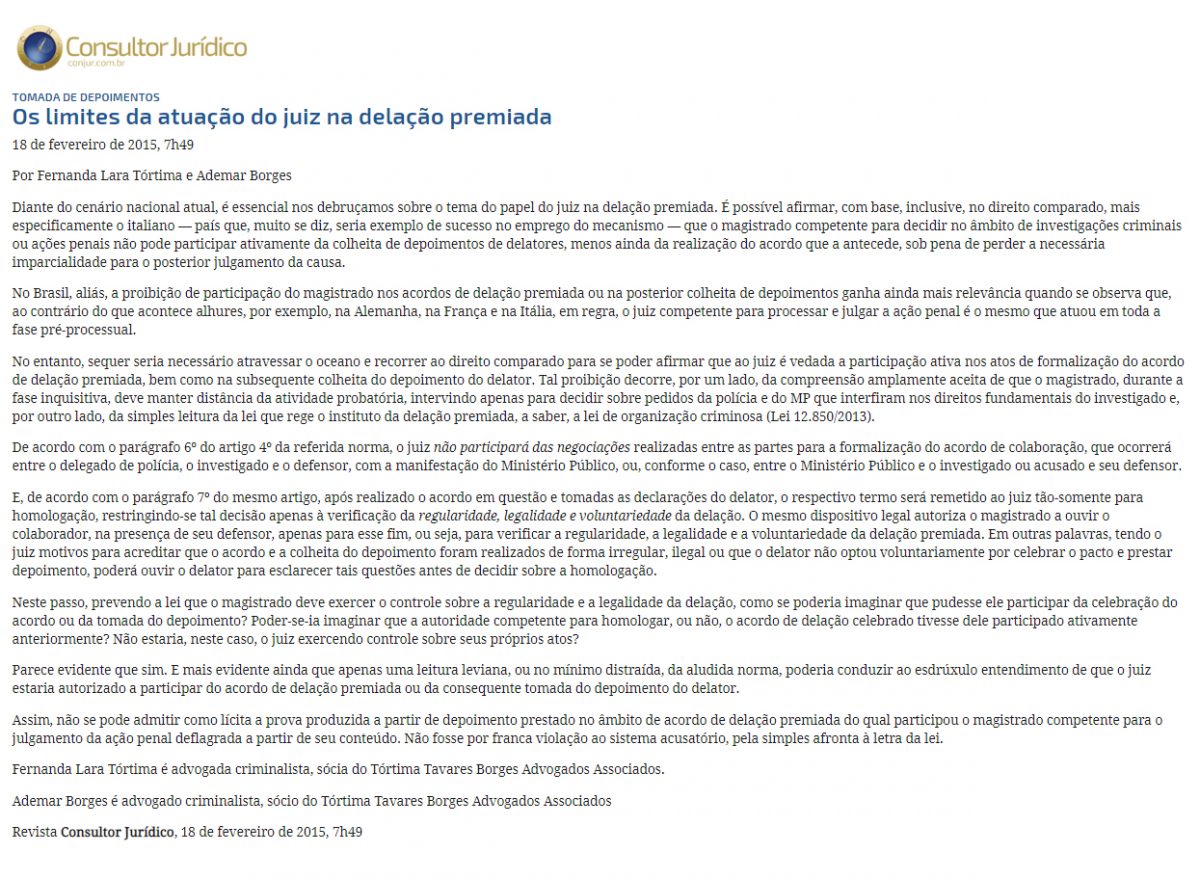Given the current national context, it is essential to reflect on the role of judges in plea bargaining. Based on comparative law, particularly the Italian system—which is often cited as a successful example of using this mechanism—it is clear that the judge responsible for deciding in the context of criminal investigations or prosecutions must not actively participate in collecting testimony from collaborators, much less in the negotiation of the agreements preceding them. Such involvement would compromise the necessary impartiality for rendering a subsequent judgment in the case.
In Brazil, this prohibition against judicial participation in plea bargaining agreements or the collection of testimony is even more significant given that, unlike in other jurisdictions such as Germany, France, and Italy, the judge who processes and adjudicates the case is usually the same one who handled the entire pretrial phase.
However, one need not look across the ocean to comparative law to affirm that judges are barred from actively participating in formalizing plea agreements or collecting testimony from collaborators. This prohibition arises from two key factors: first, the widely accepted understanding that during the investigative phase, a judge must remain detached from evidentiary activities, intervening only to rule on requests from the police or the prosecutor’s office that may impact the fundamental rights of the accused. Second, the prohibition is explicitly outlined in the law governing plea bargaining, specifically the Organized Crime Act (Law 12,850/2013).
According to paragraph 6 of Article 4 of this law, the judge may not participate in the negotiations conducted between the parties to formalize a collaboration agreement, which are carried out between the police investigator, the suspect, and their legal counsel, with the participation of the prosecutor’s office. Alternatively, these negotiations may occur between the prosecutor’s office and the suspect or accused and their counsel. Additionally, paragraph 7 of the same article stipulates that once the agreement has been finalized and the collaborator’s testimony recorded, the corresponding documentation must be submitted to the judge solely for homologation. The judge’s role in this context is restricted to verifying the regularity, legality, and voluntariness of the plea agreement. The same provision allows the judge to question the collaborator, in the presence of their legal counsel, but exclusively for these purposes: to confirm the agreement’s regularity, legality, and voluntariness. In other words, if the judge has reasons to believe that the agreement or the testimony was conducted irregularly, unlawfully, or without the collaborator’s voluntary consent, they may question the collaborator to clarify these issues before deciding on homologation.
Considering that the law mandates the judge to oversee the regularity and legality of plea agreements, how could one imagine that the judge might also participate in negotiating the agreement or collecting testimony? Could one envision the authority responsible for homologating—or not—the plea agreement being actively involved in its earlier stages? Would the judge, in such cases, not be exercising oversight over their own actions?
The answer seems obvious. It is even more evident that only a superficial or careless interpretation of the aforementioned law could lead to the absurd conclusion that a judge is permitted to participate in plea agreements or in taking testimony from collaborators.
Therefore, any evidence derived from testimony given under a plea agreement in which the presiding judge participated cannot be considered admissible. Such involvement would constitute a blatant violation of the accusatory system and a direct affront to the letter of the law.
Fernanda Lara Tórtima is a criminal lawyer and partner at Bidino Tórtima Advogados Associados.
Ademar Borges is a criminal lawyer and partner at Tórtima Tavares Borges Advogados Associados.

